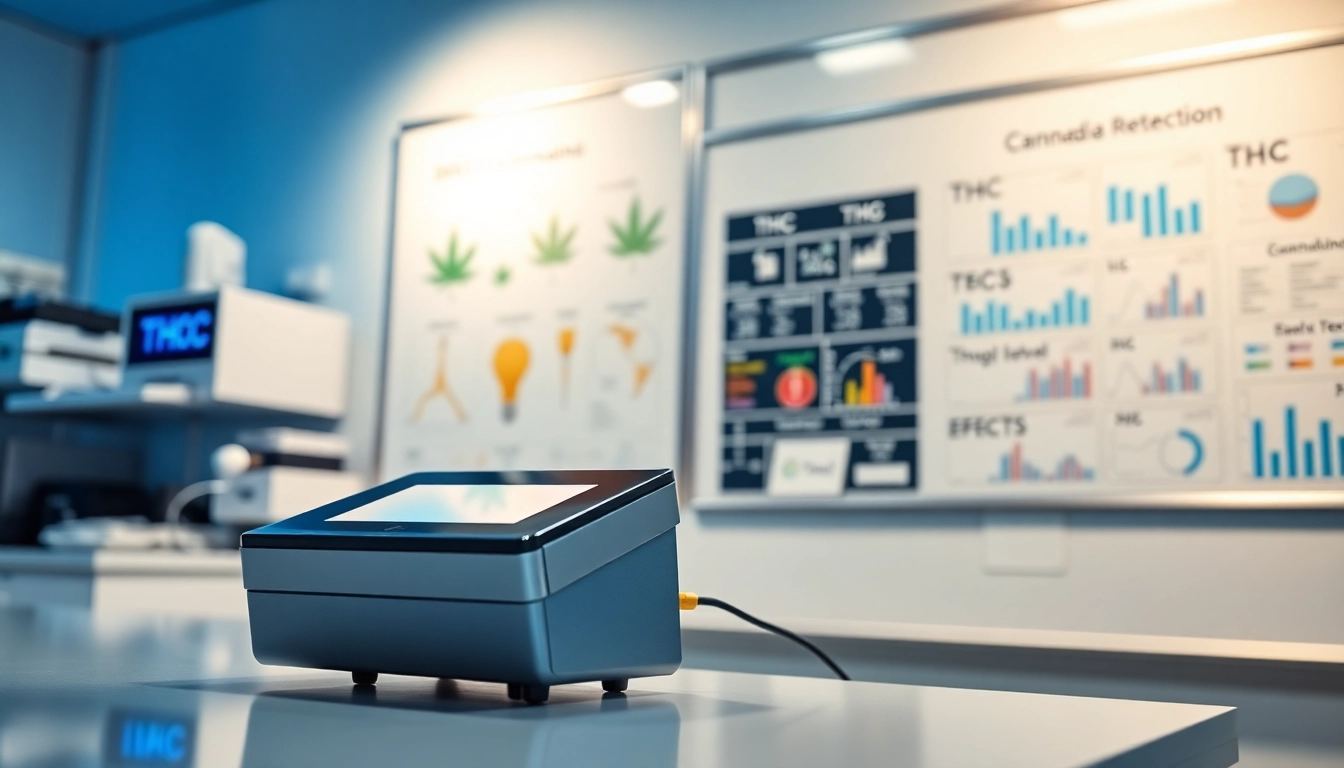Understanding Marijuana Impairment
As marijuana legalization expands across the United States, understanding the nuances of marijuana impairment is increasingly critical, especially in contexts involving road safety and workplace conduct. Defining impairment due to marijuana use involves several physiological and psychological facets, which complicate the creation of standardized testing methods. Observations of behavioral changes, combined with marijuana impairment test results, can provide insights into how THC affects individuals in real-time scenarios. This article will delve into the complexities surrounding marijuana impairment, its assessment, and modern testing competencies.
What Constitutes Marijuana Impairment?
Marijuana impairment refers to a state where an individual’s ability to operate a vehicle or perform tasks is compromised due to the psychoactive effects of THC (tetrahydrocannabinol), the primary intoxicating compound in cannabis. Unlike alcohol, where impairment can be quantified through Blood Alcohol Concentration (BAC) levels, THC’s effects are less straightforward.
Impacts may include decreased motor coordination, altered judgment, and an impaired perception of time and distance—all crucial for safe driving or operating machinery. Observational signs of impairment can include:
- Slow reaction times
- Poor balance and coordination
- Difficulty concentrating
- Erratic behavior or speech
Additionally, THC remains in the body longer than the effects it produces, further complicating assessments of impairment. Legal limits for THC in the blood vary, and jurisdictions that have implemented such measures face challenges in enforcement and public safety.
Physiological Effects of THC on Driving
THC interacts with the endocannabinoid system in the body, affecting key cognitive functions. The impairment can stem from various physiological effects, including:
- Motor Skills: THC can affect fine motor skills, vital for driving.
- Cognitive Functions: Judgment, decision-making, and reaction times can suffer.
- Perception: Drivers may misjudge distances and speeds, leading to hazardous driving conditions.
Studies suggest that the combination of these impairments leads to increased risk on the road, comparable to alcohol-impaired driving. Law enforcement and researchers are working to develop reliable methods of assessing these challenges in practice.
Legal Challenges in Defining Impairment
One of the most prominent issues in the legal system surrounding marijuana impairment is the absence of a universally accepted metric for impairment like BAC for alcohol. This discrepancy raises numerous challenges, including:
- Difficulty establishing legal thresholds for THC in different jurisdictions.
- The variability of individual responses to THC, influenced by factors such as tolerance, usage patterns, and biochemical variability.
- Legal implications surrounding the enforcement of roadside testing and the admissibility of test results in court.
As stated by legal experts, “no one test or measure currently exists to demonstrate driver impairment resulting from THC,” emphasizing that a multi-faceted approach combining behavioral assessments and biological testing may be necessary.
Methods for Testing Marijuana Impairment
Testing for marijuana impairment incorporates several methodologies, each with its strengths and limitations. This section investigates some of the most common methods currently in use.
Overview of Common Testing Techniques
The two primary forms of testing for marijuana use include biological fluid tests and observational assessments. The most prevalent testing techniques include:
- Urine Tests: Common in workplace settings, these tests can detect THC metabolites, but not the immediate impairment effects.
- Saliva Tests: Offering quicker results and used in roadside checks, saliva tests can provide evidence of recent use but have variability in detection windows.
- Blood Tests: Considered more accurate for assessing active impairment, blood tests can indicate current THC levels but are more invasive.
Field Sobriety vs. Blood Testing
Field sobriety tests (FSTs) are often employed by officers during traffic stops to gauge impairment. While these tests are designed to assess physical and cognitive capabilities, they have been criticized for lack of standardization and potential biases.
In contrast, blood testing provides a biological basis for assessing impairment, but it requires medical personnel and time, thus complicating immediate law enforcement actions. As a result, the integration of both FSTs and blood tests may lead to a more nuanced approach to determining impairment.
Emerging Technologies in Cannabis Testing
Innovations in testing technology are evolving rapidly in the field of cannabis impairment. Real-time testing solutions, such as mobile breath analyzers and non-invasive brain imaging tools, are currently under investigation. These technologies have the potential to provide immediate results and may bridge the gap between alcohol testing and cannabis impairment.
Promising studies present alternative measurement methods that may enhance the accuracy and reliability of detecting cannabis impairment. For instance, researchers are developing devices that measure physiological changes linked to THC’s effects, creating new avenues for safer roadways and workplaces.
Legal and Workplace Considerations
As more states legalize marijuana, employers face unique challenges regarding employee conduct and safety. The implications of marijuana use can vary significantly based on local laws, making it critical for organizations to establish comprehensive drug policies.
Employer Policies on Marijuana Use and Impairment
Developing clear workplace policies is paramount for maintaining safety and compliance. Employers in legalized regions must navigate potential conflicts between state laws and organizational goals. Key considerations include:
- Setting clear guidelines on marijuana use during working hours and outlining testing policies.
- Understanding employee rights regarding medical marijuana use and its potential interactions with workplace performance.
- Providing training for managers and HR professionals on the complexities of marijuana impairment assessment.
Rights of Employees in Legalized States
Employees in states with legalized marijuana often possess rights that can complicate workplace policies. Employers are encouraged to remain informed about these rights, including protections for medical marijuana users. This necessitates:
- Engaging in open dialogue with employees about their rights and responsibilities.
- Implementing educational programs to inform staff about the effects of marijuana and policies in place for use.
- Ensuring any testing policies comply with state laws, protecting both the company and employee’s interests.
Impact of Impairment Testing on Workplace Safety
Incorporating impairment testing within workplace safety programs can significantly mitigate risks associated with marijuana use. Studies show that clear and enforced policies can lead to improved safety outcomes. Key strategies include:
- Conducting regular safety training that includes information about impairment and its consequences.
- Establishing protocols for responding to impairment observations, ensuring a supportive, fair process.
- Utilizing testing technology that promotes rapid, accurate assessments of employee impairment without stigmatizing users.
Best Practices for Conducting Impairment Tests
To ensure reliability and fairness, implementing best practices in impairment testing is essential. This section outlines effective strategies for organizations and law enforcement entities.
Establishing Accurate Testing Protocols
Defining clear testing protocols helps to standardize the process, which improves accountability and transparency. Key components of successful protocols include:
- Regular updates based on emerging research and technology advancements.
- Involving legal counsel to ensure compliance with local and federal laws.
- Establishing a step-by-step guide for conducting and interpreting test results to minimize subjectivity.
Training for Testing Administrators
Proper training for individuals conducting impairment tests is vital. Training programs should encompass:
- The physiological effects of THC and alcohol on behavior.
- Updating administrators on current testing technologies and protocols.
- Recognizing and minimizing biases during assessments.
With well-trained administrators, organizations can build public trust regarding the legitimacy and fairness of their testing protocols, reducing instances of disputes.
Handling Test Results Responsibly
Managing test results necessitates both sensitivity and accuracy. Best practices include:
- Ensuring confidentiality and respect for individual rights throughout the testing process.
- Having a clear plan for addressing positive results, including opportunities for employees to explain their circumstances.
- Utilizing results to inform policy adjustments, ultimately enhancing workplace safety rather than merely penalizing individuals.
Future of Marijuana Impairment Testing
The landscape of marijuana impairment testing is continuously evolving. With advances in technology and research, the future holds promise for more effective and equitable testing methods.
Research Trends in THC Detection
Future research initiatives are increasingly focusing on the development of non-invasive methods to evaluate THC levels and impairment reliably. This includes innovations in:
- Biomarkers that identify impairment levels through physiological changes.
- Software that can analyze behavioral patterns indicative of impairment.
- Collaborative efforts between technology companies and researchers to establish standardized testing protocols.
Potential Changes in Legislation
As more states navigate marijuana legalization, legislative changes regarding impairment testing are expected. Anticipated developments may include:
- Establishing clearer guidelines for THC limits in driving that consider immediate impairment risk.
- New requirements for employers regarding workplace policies on marijuana use and employee rights.
- National conversations surrounding public safety and marijuana usage, potentially influencing federal law reforms.
Advancements in Testing Technology
Emerging technologies will play a crucial role in shaping the future of marijuana impairment testing. Expected advancements include:
- Portable devices that provide quick, reliable impairment assessments on-site.
- Integration of AI and machine learning to process behavioral cues and determine impairment levels.
- Enhanced data sharing between law enforcement and testing companies to streamline testing processes and improve accuracy.




